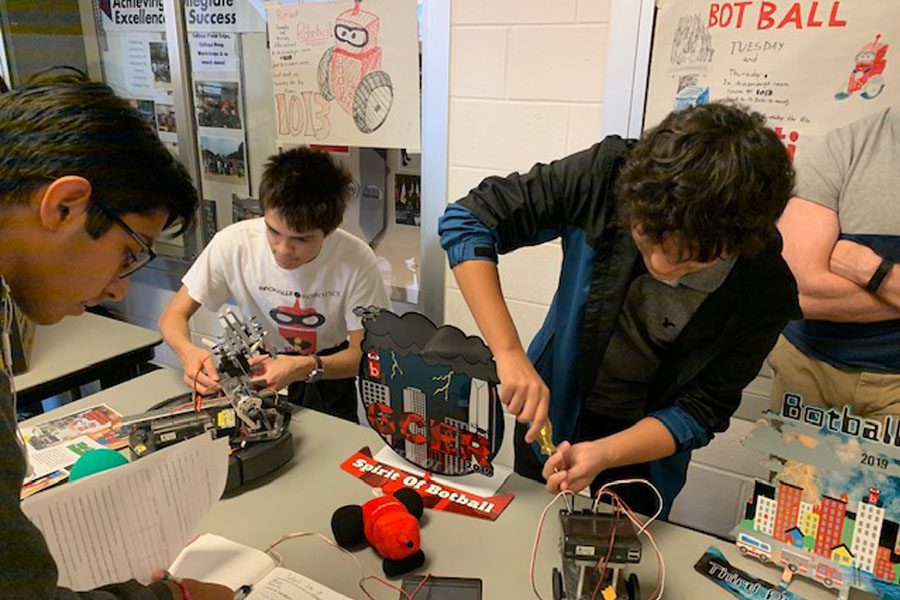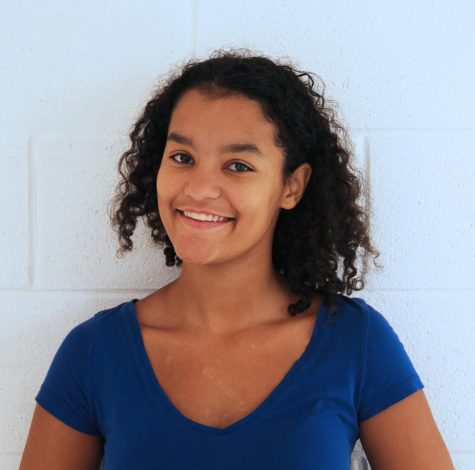Botball Team Ranks 5th Worldwide
The Incredibots promote their robots at the annual RHS club fair. They are ranked fifth in the world after the Global Conference on Educational Robotics competition.
October 25, 2019
After competing at the Global Conference on Educational Robotics (GCER) RHS’ Botball team, the Incredibots, now ranks fifth place worldwide.
GCER is a STEM conference that is aimed towards students, teachers, professionals and enthusiasts in the technology community. It features a Robotics showcase, pre-conference workshops, panels from STEM professionals that introduced ideas on technological innovation and competitions between other teams’ robots. This year, over 70 Botball teams attended the GCER.
15 members of the Botball team traveled to Oklahoma for the GCER, which was held from July 7 to July 11.
“Every part of the trip was exciting, even just the plane ride down,” junior team member Ashlyn Casp said.
While regional competitions are mainly focused on Botball and matches between the robots themselves, GCER is a place for intellectual STEM enthusiasts to congregate, RHS’ team president Jaxon Lee said.
The main objective of Botball competitions is to get the most points in the arena, changing design and theme yearly. Teams gain points by having their robots complete tasks such as moving balls, pompoms and other objects to designated areas. Each task is worth a different amount of points, which then determine ranking.
Botball competitions are categorized by individual seeding rounds and double elimination rounds. Similar to practice rounds, the scores gathered in seeding rounds are used to determine where Botball teams rank for the next round. At the GCER, there are two seeding rounds. During the double-elimination round, teams compete against each other in a tournament setting until they are eliminated, dictated by how many points they obtain in the competition.
The Incredibots ranked 14th in their first round of seeding and 11th in their second round. In the first round of the double-elimination portion, the Incredibots competed against the sixth-ranked team and continued onto the second round, in which they lost to the third-ranked team. The team then continued through three more rounds of double elimination, against various groups, before ultimately losing a second time, earning them fifth place in the world.
The Botball team also earned the Spirit of Botball award, which is chosen by a judge, given to teams who are not only enthusiastic about Botball but who are also willing to aid other teams during competitions. This is attributed to the team’s open-source coding, which allows other teams to use the code from the Incredibot’s robots to fix any coding issues of their own, Junior team member James Schmidtlein said.
In a Botball match, team robots start by signaling a light. Robots maneuver the arena for two minutes, directed by coding and sensors installed in the bot, before stopping themselves at the end of the match. Team members are not allowed to touch the robot during the match, it must be completely autonomous.
The Incredibots competed with various teams from around the world, including those from China, Austria and Switzerland. When the group had downtime, they learned from guest speakers at the GCER, visited an autonomous robot showcase, watched other teams’ robots compete and met other teams, trading team pins and botball advice.
“It was really cool to talk to all these teams from around the world, see their approach, and even learn something from them,” Casp said.
While the Incredibots now place high in international rankings, it was not always that way. In the past three GCERs, the team generally left with low scores. For the 2018 GCER competition, the Botball team placed 10th, making a massive improvement by jumping five places this year.
Because the team was not satisfied with their ranking from previous years, preparing for this year’s GCER was a priority for the team.
“This year, we turned things around and needed to focus more on making sure things were good before we got to the competition,” Lee said.
Team members ran through multiple 13-hour practices and held several meets over the summer to prepare for the competition. The team attended various workshops detailing how they could improve their robots while at the GCER, worked on fixing past mistakes made at regional competitions, and had better communication, functioning more like a team than in previous years, Lee and team sponsor David Baker said.
Now placing fifth worldwide, the team is even more motivated to continue to reach higher levels in the coming season, and eventually at the next GCER in St. Augustine, Fla. next summer.






